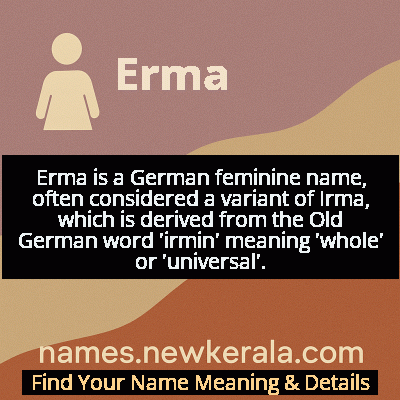Erma Name Meaning & Details
Origin, Popularity, Numerology Analysis & Name Meaning of Erma
Discover the origin, meaning, and cultural significance of the name ERMA. Delve into its historical roots and explore the lasting impact it has had on communities and traditions.
Name
Erma
Gender
Female
Origin
German
Lucky Number
1
Meaning of the Name - Erma
Erma is a German feminine name, often considered a variant of Irma, which is derived from the Old German word 'irmin' meaning 'whole' or 'universal'.
Erma - Complete Numerology Analysis
Your Numerology Number
Based on Pythagorean Numerology System
Ruling Planet
Sun
Positive Nature
Leaders, ambitious, highly driven, self-reliant, innovative.
Negative Traits
Overly aggressive, domineering, impatient, selfish.
Lucky Colours
Red, orange, gold.
Lucky Days
Sunday.
Lucky Stones
Ruby, garnet.
Harmony Numbers
2, 3, 9.
Best Suited Professions
Entrepreneurs, managers, engineers.
What People Like About You
Courage, determination, leadership.
Famous People Named Erma
Erma Bombeck
Journalist and Humorist
One of America's most popular humor columnists, author of 15 books, and pioneer for women in journalism
Erma Franklin
Singer
American soul singer known for the original version of "Piece of My Heart" and sister of Aretha Franklin
Saint Erma
Religious Figure
Early Christian martyr venerated in the Eastern Orthodox Church
Erma Stewart
Educator
Pioneering African-American educator who established schools in post-Civil War South
Name Variations & International Equivalents
Click on blue names to explore their detailed meanings. Gray names with will be available soon.
Cultural & Historical Significance
The name experienced a revival during the 19th century Romantic movement when there was renewed interest in Germanic mythology and folklore. Throughout history, Erma has maintained its association with feminine strength and resilience, often chosen for daughters in families with military traditions or those valuing strong female role models. The name's cultural journey reflects the broader story of how ancient pagan names were adapted into Christian European naming traditions while preserving their original powerful meanings.
Extended Personality Analysis
Women named Erma are typically perceived as strong-willed, determined individuals with natural leadership qualities. They often exhibit a protective nature toward loved ones and possess an inner strength that helps them overcome challenges. Ermas are known for their practical wisdom and ability to make difficult decisions under pressure. Their war goddess namesake reflects in their fighting spirit and resilience when facing adversity.
However, this strength is balanced with deep compassion and loyalty to their inner circle. They tend to be highly organized, methodical thinkers who approach problems with strategic precision. Many Ermas develop strong communication skills and often excel in fields requiring negotiation or mediation. Their combination of strength and empathy makes them natural caregivers and community leaders who inspire confidence in others. The name seems to attract or cultivate individuals who embody both traditional feminine virtues and modern leadership capabilities.
Modern Usage & Popularity
In contemporary times, Erma has become a relatively rare name, experiencing a decline in popularity since its peak in the early 20th century. According to Social Security Administration data, Erma last ranked in the top 1000 names in the 1970s. However, the name is currently experiencing a modest revival among parents seeking vintage names with strong meanings and historical depth. Modern usage tends to be concentrated in families with German heritage or those specifically drawn to mythological names. The name appeals to parents looking for strong, traditional names that aren't overly common. In recent years, there's been increased interest in Erma as a distinctive alternative to more popular vintage names like Emma or Clara. The name maintains particular popularity in German-speaking countries and among communities with strong European cultural ties, while remaining relatively uncommon in mainstream English-speaking naming trends.
Symbolic & Spiritual Meanings
Symbolically, Erma represents strength, protection, and universal wholeness. The name carries the metaphorical weight of a shield-bearer or protector, reflecting its war goddess origins. It symbolizes the balance between feminine grace and warrior strength—the ability to be both nurturing and fiercely protective. In symbolic terms, Erma represents the concept of 'the complete woman' who embodies multiple strengths simultaneously: wisdom, courage, compassion, and resilience. The name also carries connotations of cosmic order and universal balance from its Germanic roots. Metaphorically, Erma symbolizes the inner warrior that exists within every person—the strength to fight for what matters and protect what one loves. It represents the idea that true strength includes both the capacity for battle and the wisdom to know when to wield that power, making it a name rich with layered symbolic meaning for modern times.

